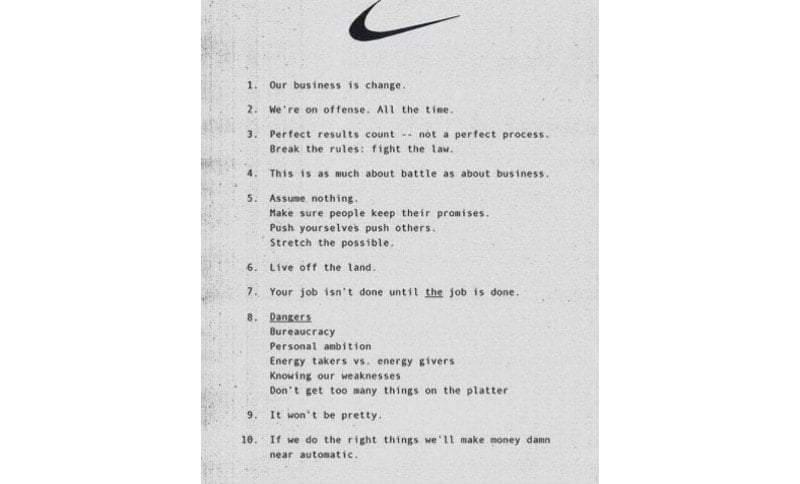Earlier this year Nick Law, creative chairperson at Accenture Song, returned to his home turf of Sydney, Australia, to present at the This Way Up advertising festival.
“How to be interesting and useful when everything is changing” challenged the advertising industry’s existential tug of war: an obsession with best practice, a “love affair” as Law deemed it, versus a stagnant and sentimental hold on tradition.
Over time, Law has developed five fundamental tenets: a roadmap for an industry that feels it has lost its way.
“Five principles that I’ve learned through practice,” Law explained to his festival audience. “None of this is academic at all. It’s all based on spending time, making mistakes, and seeing what goes right.”
Mediaweek caught up with Law to dig deeper.
A quick recap of Nick’s Laws
1. Be consistent with principles, dynamic with practices
“Principles aren’t always things that make you feel good,” said Law. “Agencies aren’t rock bands. We’re businesses.”
2. You can’t be creative without technology
Law clarified, “All mediums are technology.”
3. Get to deep simplicity
“Sometimes you forget that your depth of knowledge is not something the rest of the world is particularly interested in.”
Law said, “Go through complexity to get to simplicity.”
4. Start in the middle
The advertising industry is concentrating its treatment of the purchase funnel as if it was hourglass, with art (Brand) and maths (Performance) on the flared ends, when it should be looking like an onion. That is, more attention needs to be given to consideration or “the understanding phase”.
Law said, “We need to reorient our industry around the middle,” as well as “dignify bottom of the funnel with some craft.”
5. To make new things remake yourself
Law likened AI to the early days of film. “We are so enamoured with the parlour trick,” he said.
“It’s like these people at the turn of the century, staring at a wall where there’s this projected train on the film. The technical achievement is so astonishing, that they haven’t applied any sort of taste, or any craft, or any grammar to it. That’s where we are.”
To stand out in the inevitable sea of “abundant mediocrity” that AI will beckon, Law believes technology needs to be harnessed with respect to the power of creative people, through teams that unite design, story and tech departments.
Which principle does the industry get wrong most often?
“Having principles to begin with that you can apply to new practices as they emerge,” is the most common transgression, Law responded to Mediaweek.
He continued, “The problem is, if you are just reactive to new practices, and you don’t have a point of view about how you as a company, or you as a creative organisation, should approach this opportunity, given who you are, then you end up just chasing your tail.”
Consequently, “you become less differentiated,” Law added.
Perhaps the greatest mistake he sees time and time again is organisations pouring too much effort into the “fridge magnet stuff,” because, ultimately, those lofty, heroic statements are downright unactionable. Words like “disruptor” come to mind.
“Yeah, I have no idea what that means,” laughed Law.
“They’re just meant to be like a rallying cry or something. I think we need to be much more practical with our principles.”

1977 Nike Brand Manifesto
During his presentation, Law pointed to Nike’s 1977 Brand Manifesto as a prime example.
Having worked on Nike as well as scores of other legacy brands including apple and Beats by Dre, Law could attest, “To spark creativity, it often gets at its most vivid when the limitations are there. There’s something about that that forces creativity.”
Who will be next to burnout on the whitespace?
You could argue the industry has become tunnel visioned, with a preoccupation on tech and AI that has eclipsed the ever changing cultural and socio-political needs of the consumer.
“We don’t need humans to be more like machines. We need humans to be more like humans and machines to be machines,” Law told Mediaweek.
“They have got to be out in the world,” he stated, reflecting on how advertisers can be so swept up in pioneering best practice in amongst the glory of new technology that the human on the receiving end is forgotten.
“I’m often surprised how people take for granted certain things as professionals that they would never put up with the civilians.
“There was a while there, especially the beginning of social media, where companies convinced themselves that they needed to be ‘always on’… When they go home, do they, as a civilian, want to consume constant information from one brand? Well, mostly no.”
Building on this thought, Law invoked the beginning of the Internet, “There were lots of web shops; little agencies that could build websites. There was so much demand for it, you didn’t really have to be that differentiated, you just needed to have the technical skills to build a website.”
In the end, “As soon as [the market] matured to a point where the clients were more discerning about what they want, then a lot of these companies disappeared. They burnt out on the whitespace; [they] didn’t have anything to sustain that was differentiated.”
In light of this, Law said, “I don’t like when we say ‘data-driven’, I like when we say ‘data-informed.’
“This idea that you can only run a company or a marketing department based on hard data is completely wrong.
“Data is an artefact of the past, and it’s not always very clear. It should be helping us think through problems and trying to tease out opportunities, but it shouldn’t be driving stuff.
“You don’t want to be without it, because there’s going to be stuff there that you can learn that you wouldn’t otherwise learn. But all the magical stuff is not always predictable.
“Sometimes anticipating those things is part of understanding culture.”
Is it more effective to be interesting or useful?
Returning to the theme of his presentation at This Way Up, “How to be interesting and useful when everything is changing,” Mediaweek challenged Law to name which eponymous value is more important in advertising?
“As a designer, for a long time I thought that ‘useful’ was the most important thing, just by definition, our role, because designers are so bloody righteous. But as a civilian, I just like ‘interesting.’”
At the same time, he considered, “Great advertising sometimes can inform me about something I didn’t know about, and that’s useful. So actually, in a way, I think there is an intersection there.”
Law recalled the advent of Google, a feat of design ingenuity that still epitomises the strength of such an intersection.
“Google was so magical,” he reminisced. “One of the things that distinguishes it was that they didn’t have advertising, they just had the search entry field on this sort of desiccated white page. But because it was so useful, it was magical.”
